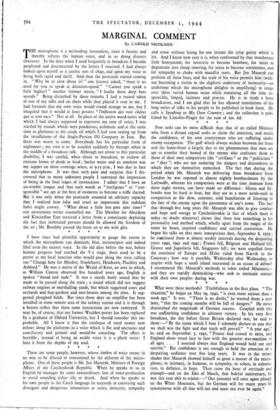Few tasks can be more difficult than that of an
exiled Minister who from a distant capital seeks to claim the attention, and retain the confidence, of his own countrymen who are suffering under enemy occupation. The gulf which always widens between the front and the home-front is largely due to the phenomenon that men are apt to transfer their hatred of the enemy who confronts them to those of their own compatriots (the " civilians " or the " politicians " or " they ") who are not enduring the dangers and discomforts in which they are themselves enmeshed. The fact that during the period when Mr. Masaryk was delivering these broadcasts from London he was exposed to almost nightly bombardment by the Luftwaffe, whereas his compatriots were at the time immune from these night terrors, can have made no difference: blitzes and fly- bombs may be hard to bear, but they are as a mere nettle-rash in comparison to the slow, constant, cold humiliation of listening to the feet of the enemy upon the pavements of one's town. The fact that through five long years Mr. Masaryk was able to give comfort and hope and energy to Czechoslovakia (a fact of which there is today no doubt whatever) shows that there was something in his personality and method which, wholly apart from the magic of the name he bears, inspired confidence and carried conviction. He began his talks on that most inauspicious date, September 8, 1939 he continued them at almost weekly intervals during the despairing years 1940, 1941 and 1942 ; France fell, Belgium and Holland fell, Greece and Jugoslavia fell, Singapore fell ; we were expelled from the continent of Europe and Hitler ruled from Narvik to the Caucasus ; how was it possible, Wednesday after Wednesday, to inspire with hope a small island marooned in an ocean of defeat? I recommend Mr. Masaryk's methods to other exiled Ministers,— and they are rapidly diminishing—who seek to maintain contact with their own peoples during war.
* * * *


























 Previous page
Previous page